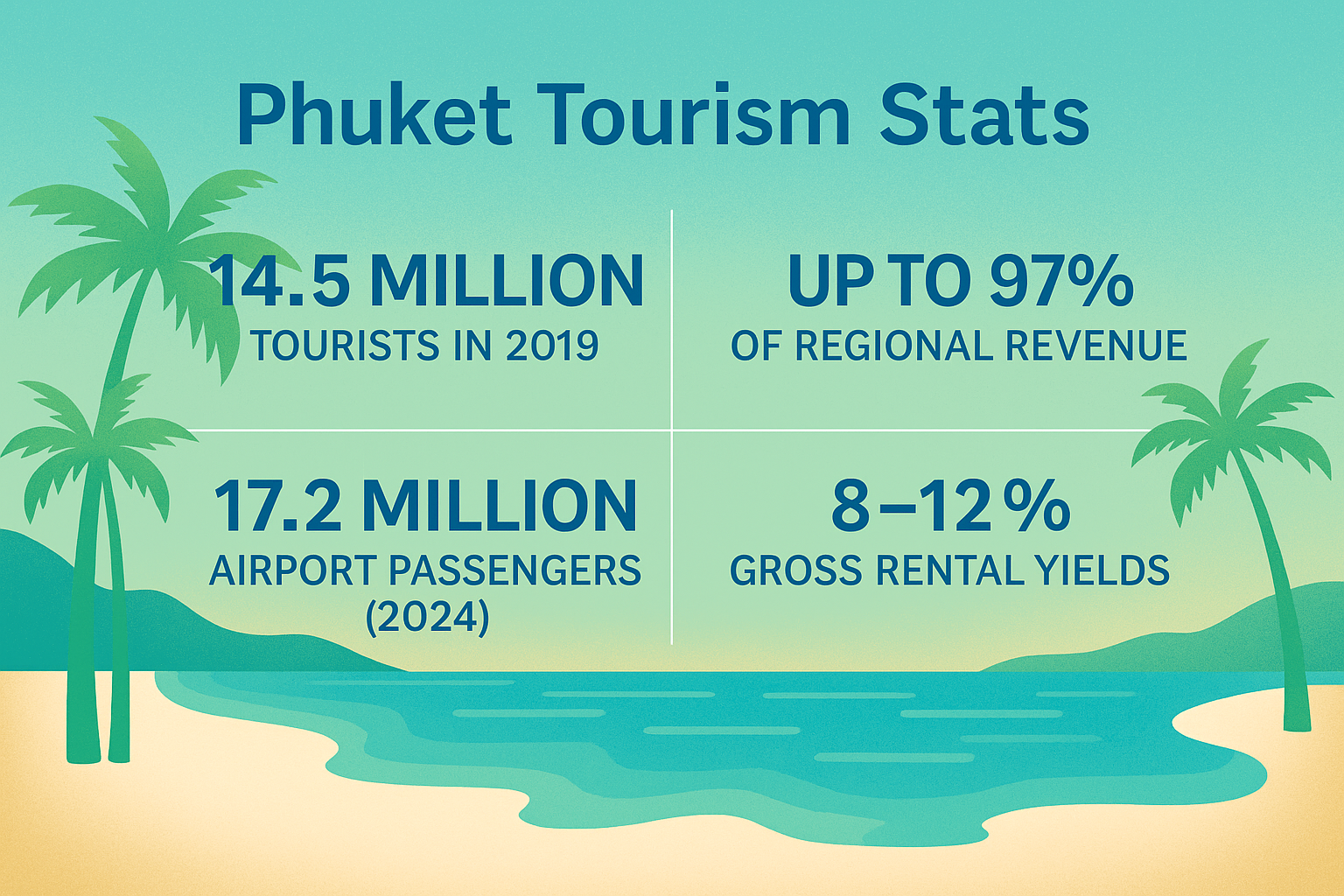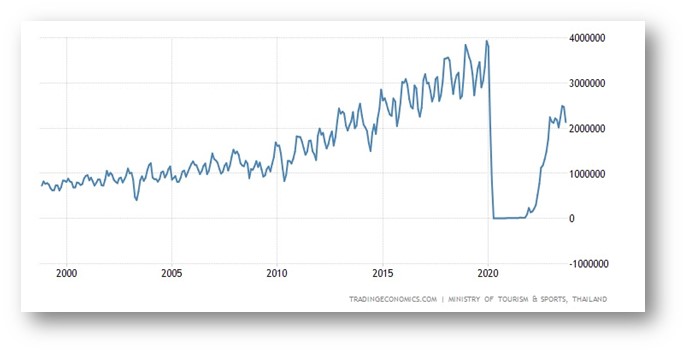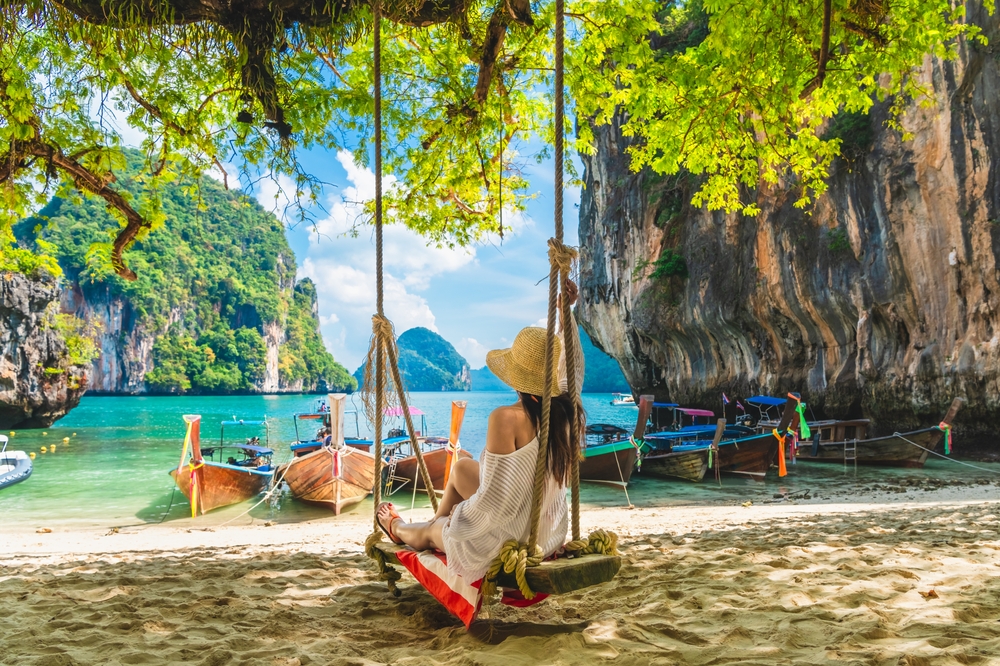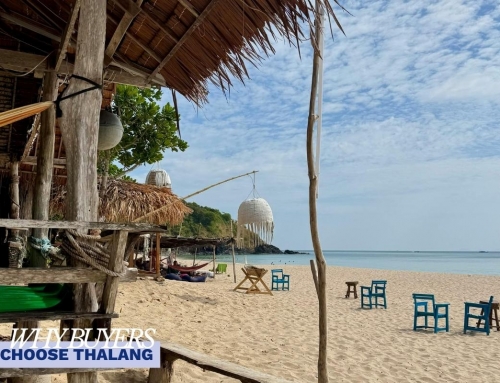How the Phuket Tourism Real Estate Market Has Evolved
Over the past few decades, both Phuket’s tourism industry and its real estate sector have expanded dramatically, often rising in tandem. While tourism can thrive independently of the property market, the reverse is not true. The success of the Phuket tourism real estate market is closely tied to the health of the island’s economy.
A Brief History of Tourism and Development in Phuket
Phuket has been welcoming visitors for decades, but in the late 1970s and early 1980s the island was a very different place. A few luxury hotels had started to appear, yet most beaches remained quiet, and infrastructure was still minimal.
Fast forward to today, and Phuket is a globally recognised destination, drawing millions of international visitors each year. The 2004 tsunami marked a turning point, triggering waves of redevelopment and expansion, and the two decades since have seen record numbers of arrivals.
Tourism suffered a sharp decline during the COVID-19 pandemic, but its recovery has been swift. As international travel resumes, Phuket once again attracts visitors in numbers that drive both local businesses and the wider economy.
How Much Does Phuket (and Thailand) Rely on Tourism?
Tourism is a cornerstone of Thailand’s national economy. The country consistently ranks among the world’s leaders in tourism revenue, with Phuket playing a major role.
-
In 2019, Thailand welcomed 38 million visitors, of whom around 14.5 million came to Phuket.
-
That same year, Phuket generated over 400 billion THB in tourism revenue, second only to Bangkok.
-
Tourism accounts for an estimated 97% of Phuket’s local revenue, making it one of the most tourism-dependent destinations in the world.
According to The Nation, Thai authorities have acknowledged this heavy reliance and announced plans to diversify Phuket’s economy by 2027. Proposed areas of development include culinary tourism, health and wellness, education, sports, and business events.
Phuket’s dependence on tourism is not just economic, it directly shapes infrastructure, community planning, and the real estate landscape. High visitor numbers, repeat tourism, and demand for rentals all feed into a cycle of growth that makes tourism and property development inseparable.

Why Tourism Directly Shapes the Phuket Real Estate Market
1. Tourism as the Backbone of Phuket’s Economy
Tourism accounts for as much as 97% of Phuket’s total revenue, making the island one of the most tourism-reliant locations worldwide. When visitor numbers fluctuate, the effects ripple through every sector, including real estate.
2. Visitor Influx Creates Long-Term Settlement Demand
Phuket attracts repeat visitors who often extend their stays or decide to make the island a long-term base. This pattern, where frequent tourism gradually evolves into relocation, has been observed consistently over the past two decades.
3. Accommodation Needs Reinforce Housing Demand
Tourism fuels a steady demand for accommodation of all kinds. Hotels and resorts dominate, but the presence of long-stay visitors, digital nomads, and seasonal residents also supports demand for condominiums and apartments, especially in areas close to beaches, international schools, or co-working hubs.
4. Tourism Spurs Infrastructure Development
Revenue from Phuket’s tourism industry is reinvested into major infrastructure projects that benefit residents as well as visitors.
-
Phuket International Airport handled over 17 million passengers in 2024, a jump from 13.9 million in 2023.
-
Road upgrades, expanded utilities, and discussions around mass transit have all been linked to the island’s need to serve growing visitor numbers.
These improvements enhance everyday living conditions and make different parts of the island more attractive for long-term settlement.
5. A Diverse International Community
Tourism introduces Phuket to people from across the globe. Some choose to stay longer, establish businesses, or relocate with families. This international mix not only enriches local culture but also brings resilience to the housing market, as demand is not tied to one single nationality or region.
6. Urban Expansion Reflects Tourism Growth
Phuket’s built-up areas have expanded steadily since the late 1980s, particularly in coastal zones. This urban growth has mirrored the rise in tourism and reflects how visitor-driven demand continues to shape the island’s development patterns.
The Correlation Between Tourism and Property in Phuket
Multiple studies confirm the strong link between the Phuket tourism real estate market and tourism trends on the island. As tourism grows, so does the demand for housing, whether for short-stay accommodation, long-term residents, or returning seasonal visitors.
Tourists are not just consumers of goods and services; many eventually choose Phuket as a semi-permanent or permanent base. This long-observed cycle underscores how closely tourism and the real estate market remain connected.
Hooked on Phuket – Why Tourists Keep Coming Back
Phuket has an undeniable allure. Many first-time visitors are captivated by the island’s culture, cuisine, natural beauty, and warm hospitality.
Whether exploring Nai Harn, Kata, Rawai, or Kamala, countless visitors return again and again. According to Wikipedia, 60% of tourists to Thailand are repeat visitors, and in Phuket, the figure is believed to be even higher.
This repeat connection is one of the reasons the Phuket tourism real estate market continues to expand. Often described as “experiential travel”, this is what makes Phuket unique. For many, it goes beyond a holiday and becomes a lifestyle.
Phuket as a Long-Term Base
Beyond its appeal as a destination, Phuket has increasingly become a place where people choose to stay longer. Retirees, digital nomads, young families, and professionals relocating from regional hubs such as Hong Kong and Singapore have all made Phuket their home.
The growth of international schools, healthcare facilities, and visa options has reinforced this shift, with more residents settling permanently or semi-permanently on the island.
The Question of Sustainability
While tourism underpins much of Phuket’s economy, there’s also recognition of the need to balance growth with sustainability. The idea of “extractive tourism” warns of the risks of uncontrolled expansion straining local resources and communities.
Fortunately, post-COVID travel patterns show a shift toward higher-quality tourism. More visitors are now seeking premium experiences, staying in 4-5 star hotels, and engaging with cultural and wellness activities. This direction offers long-term benefits for the island, as it supports both economic growth and community well-being.
Conclusion: The Phuket Tourism Real Estate Market
Phuket tourism and property remain deeply connected. As visitor numbers increase, particularly with high-spending, returning guests, the broader real estate market is indirectly strengthened by tourism’s momentum.
Phuket’s reputation as both a lifestyle destination and a permanent base continues to grow, highlighting the island’s unique position as one of the world’s most tourism-driven locations.
Related Guides
Disclaimer: The information contained in this article is provided for general informational purposes only and does not constitute legal, financial, or investment advice. While every effort has been made to ensure accuracy at the time of publication, property laws and regulations in Thailand are subject to change. Readers should always seek independent legal advice from a qualified Thai lawyer before making any property-related decision or transaction.





Social Contact